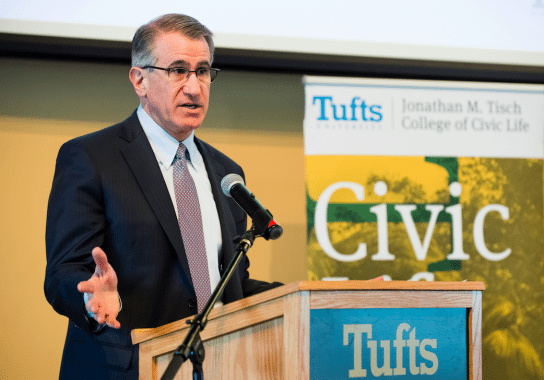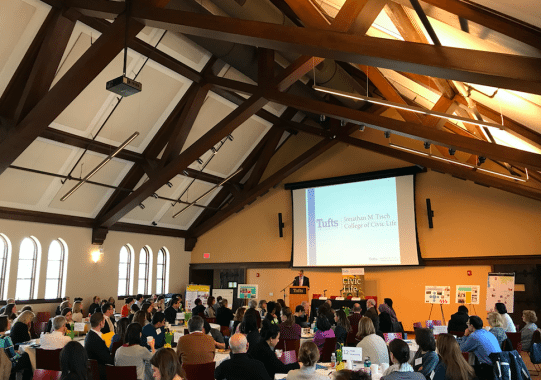With Communities, For Communities: The Promise of Engaged Research
Tuesday, April, 3rd, 2018 News
Tufts Presidential Symposium on Community Partnerships
President Anthony P. Monaco
Talloires Network Steering Committee Chair

Welcome community leaders, elected officials, Tufts faculty, staff, students, and other distinguished guests. Thank you for joining us today.
I am so pleased to host the 16th Tufts Presidential Symposium on Community Partnerships. This is one of my favorite events of the year, and one of the most important, because it allows us to celebrate and strengthen the bonds of collaboration that are so essential to us as a civically engaged university.
Each year, we select a theme that we hope will prompt timely, productive conversations about the ways we can work together to solve problems in the world around us. Today’s theme is: With Communities, For Communities: The Promise of Engaged Research.
Scholarship that addresses important public issues has always been at the heart of Tufts University’s mission. From the Fletcher School of Law and Diplomacy, to the Cummings School of Veterinary Medicine, our faculty members lead world-renowned investigations that strive to discover and promote solutions to environmental, health, social, and political problems.
We are immensely proud of this work, but we also recognize the need to continue evolving and adopting new ways to approach research in order to achieve the desired, positive impact on our communities.
In 1852 Tufts was founded to be a “light on the hill.” But today we are much more aware that the light comes from all directions. We receive illumination as much as we send it out, and we shine brightest when we shine together.
That is one of the guiding principles behind community engaged research that is centered on reciprocity and mutual benefit, because we are at our most innovative and most productive when we collaborate.
Some of the most sophisticated research requires partnerships with people who work and live in communities. They provide awareness of emerging issues, research hypotheses, credibility, access to data, valuable insights about what the data means—and, perhaps most importantly, the ability to pursue concrete change with the results.
 Many researchers want to know that their work will have a direct impact on the issues and causes they care about, whether it is through translational research for health sciences, or to understand the role of history in community development and the humanities.
Many researchers want to know that their work will have a direct impact on the issues and causes they care about, whether it is through translational research for health sciences, or to understand the role of history in community development and the humanities.
These days, that is an increasingly difficult task. There was a time when researchers could make discoveries in the lab or the library, and count on a handful of well-respected and widely read outlets to disseminate their results to the public. Perhaps they could even count on stakeholders and policymakers to base important decisions on the latest research.
In many ways, that’s no longer the case. The balkanization and distrust of our media make it more difficult to share important new research findings. Politically polarized leaders make choices that affect all of us based on partisan considerations, instead of scientific consensus.
This environment makes it even more crucial for all of us in higher education to pursue new avenues for co-creating and communicating new knowledge with community leaders like so many of you in this room. Your on-the-ground knowledge, your organizations, and very often your energy and activism become necessary parts of seeing our research make a difference.
This is true across all academic disciplines, and for every conceivable community problem. Whether you work on K-12 education, affordable housing, community health, food insecurity, the arts and humanities, or any other critical issue facing our world, there is a role and a place for community-engaged research.
We are pleased to have a panel of speakers this morning who have extensive experience leading and participating in community-engaged research. I am certain that their diverse perspectives, and the wealth of knowledge and experience gathered in this room, will produce exciting new ideas.
Please know that Tufts University always stands ready to be a willing partner in these and any other efforts that seek to strengthen our shared communities.